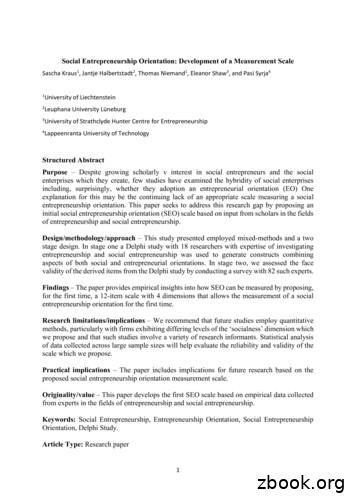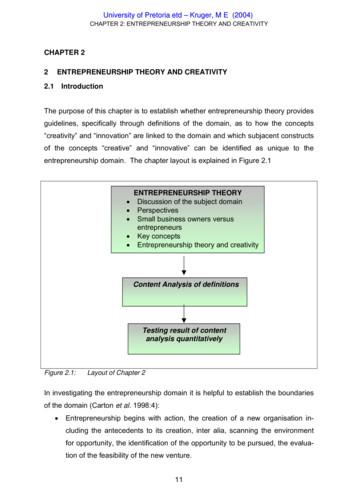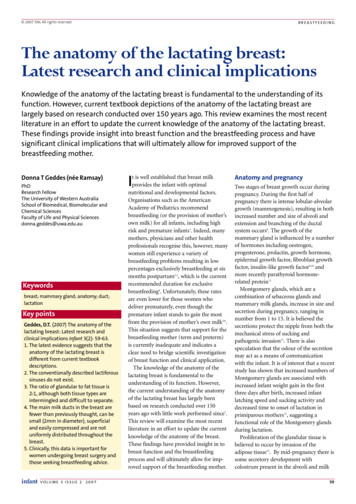LERU Paper “Student Entrepreneurship At
LERU Paper “Student entrepreneurship atresearch intensive universities: from aperipheral activity towards a newmainstream”Sheron ShamuiliaEuropean Commission, Joint Research Centre
LERU paper – research questions & focus Our society increasingly needs entrepreneurial attitudes and skills. However: What does this precisely entail? Why are research-intensive universities ideally positioned to stimulate theemergence of these attitudes and skills? How can student entrepreneurship be supported and organized? The paper tries to answer this by providing five recommendations.
Recommendation 1 – proactively develop entrepreneurial skills Universities are the training ground of tomorrow’s leaders and should proactively equipstudents with an entrepreneurial attitude and skillset. In this context, academic staff paly a crucial role. In order to be successful, ongoing commitment to invest in, and support, studententrepreneurship education activities is required (both in terms of leadership as well as directfunding). Universities need to pay attention in setting up proper assessment processes for monitoringprogress of these activities.
Recommendation 2 – interdisciplinary student work and project-based learning Societal & economic challenges are complex, and requires a multi-disciplinary team totackle Proactively develop new structures and create appropriate settings such as projectbased learning environments where students can collaborate and solve problems withpeers from different backgrounds.Picture taken from: studenten-opuitvinderspad
Recommendation 3 – reframing meaning of entrepreneurship Coherent culture and understanding with respect to entrepreneurship Reframing in way that it is discipline specific, making it relevant to all students Distinction between developing entrepreneurial attitude more broadly (cf. relevant to allstudents) and the cultivation of specific entrepreneurship skills (cf. venture creation).
Recommendation 4 – embrace bottom up entrepreneurial activities Universities have a threefold mission, where the interplay generates a culture and afertile ground for the growth of bottom-up activities. Take lead and create permissive institutional environments for this (e.g. providingcommunication infrastructure). Examples of such initiatives are IusStart and Techstart (from LCIE), being legal and technologyadvise delivered by students under the supervision of PhD students and/or experts from thenetwork. Another one is the PiP. Last but not least, funding is also made available forentrepreneurial teams via an (LCIE) innovation fund.MissionResearch
Recommendation 5 – take lead with regard to entrepreneurial education in theirentrepreneurial ecosystem. Many studies have demonstrated the important economic contribution of universities to theirregion In order to truly create knowledge economy, universities must become key players inshaping the economic landscape. Strong partnerships with local, regional, national and international players in what willbecome an entrepreneurial ecosystem. How? By leveraging their network of alumni, Being open to entrepreneurial communities and ecosystems that already exist, and Adopting an inclusive approach to avoid “university islands”
LERU paper – recommendations summary (both within and outside theuniversity)1. Research-intensive universities need to pro-actively develop the entrepreneurial2.3.4.5.skills and attitudes of their students and staff.Interdisciplinary student work and project-based learning are essentialcomponents of successful entrepreneurship education.For entrepreneurship to thrive at universities and to make it accessible and relevantto all students, its meaning needs to be reframed.Research-intensive universities need to embrace bottom-up initiatives that help tofoster an entrepreneurial culture.Universities need to be open and take the lead with regard to entrepreneurshipeducation in their entrepreneurial ecosystems.Paper and other great examples are available eripheral-activity-towards-a-new-mainstream
Thank you!
Research-intensive universities need to pro-actively develop the entrepreneurial skills and attitudes of their students and staff. 2. Interdisciplinary student work and project-based learning are essential components of successful entrepreneurship education. 3. For entrepreneurship to thrive at universities and to make it accessible and relevant
To define the entrepreneurship. To explain the significance of Entrepreneurship. To explain the Entrepreneurship Development. To describe the Dynamics of Entrepreneurship Development. 1.1 Need and significance of Entrepreneurship Development in Global contexts It is said that an economy is an effect for which entrepreneurship is the cause.
entrepreneurship orientation. This paper seeks to address this research gap by proposing an initial social entrepreneurship orientation (SEO) scale based on input from scholars in the fields of entrepreneurship and social entrepreneurship. Design/methodology/approach - This study presented employed mixed-methods and a two stage design.
CHAPTER 2: ENTREPRENEURSHIP THEORY AND CREATIVITY ctives. epreneurs. reneurship. 3:49). thought on the meaning of entrepreneurship. One group focused on the characteris-tics of entrepreneurship (e.g. innovation, growth, uniqueness) while a second group focused on the outcomes of entrepreneurship (e.g. the creation of value).
identify and describe characterizations of technology entrepreneurship, digital techno-logy entrepreneurship, and digital entrepreneurship. With this new delineation of terms, we would like to foster discussion between researchers, entrepreneurs, and policy makers on the impact of digitization on entrepreneurship, and set a future research agenda.
Digital entrepreneurship is the phenomenon associated with digital entrepreneurial activity. While the expressions ‘ICT entrepreneurship’ and ‘digital entrepreneurship’ are widely used, we have opted to use only the expression ‘digital entrepreneurship’ in this
Academic entrepreneurship: time for a rethink? 9 As academic entrepreneurship has evolved, so too must scholarly analysis of academic entrepreneurship. There has been a rise in scholarly interest in academic entrepreneurship in the social sciences (e.g., economics, sociology, psychology, and political science) and several fields of business
Global Entrepreneurship Education II- FRAMEWORK TABLE 1: CASES BY LEARNER CATEGORY III- ENTREPRENEURSHIP EDUCATION IN CHINA The Maker Space of Tsinghua University High School: Extreme Learning Process (XLP) For Entrepreneurship Education Tsinghua x-lab: a University-based Platform For Creativity, Innovation and Entrepreneurship Education
The anatomy of the lactating breast: Latest research and clinical implications Knowledge of the anatomy of the lactating breast is fundamental to the understanding of its function. However, current textbook depictions of the anatomy of the lactating breast are largely based on research conducted over 150 years ago. This review examines the most .























